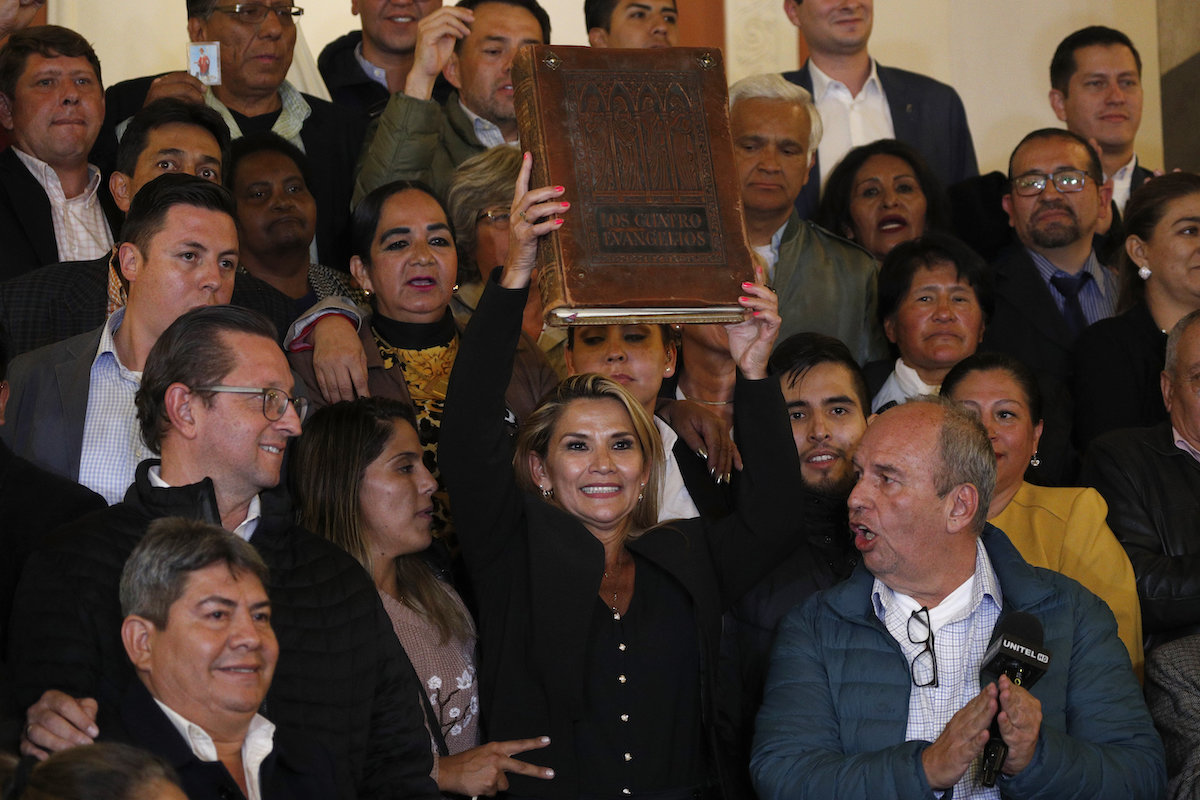

Surrounded by fellow lawmakers, the Senate’s second vice president and opposition politician Jeanine Añez, center, holds a Bible after she declared herself the country’s interim president during a session at Congress, in La Paz, Bolivia, Tuesday, Nov. 12, 2019. (AP Photo/Juan Karita)
By PAOLA FLORES, Associated Press
LA PAZ, Bolivia (AP) — A women’s rights activist and former television presenter who became an opposition leader in the Senate declared herself Bolivia’s interim president late Tuesday, promising to guide the country out of a deep crisis.
Jeanine Añez, 52, was a second-tier opposition figure until the resignation Sunday of President Evo Morales after nearly 14 years in power.
But as the Senate’s second vice president, she moved Tuesday to take temporary control of the body even though she lacked a quorum to appoint her. The Senate leader is next in line to the presidency, and she then proclaimed herself interim president to guide the Andean nation before new elections.
Celebrations and clashes quickly broke out in Bolivia among supporters and foes of Morales, who flew to exile in Mexico earlier in the day.
Bolivia’s crisis erupted after the last elections, on Oct. 20, were marred by allegations that Morales fixed the results in his favor. Violent protests swept the country, leading to police defections and finally a call from the chief of the military for Bolivia’s first indigenous president to resign.
In a dramatic scene Monday, Añez wept as she told journalists that she wanted to “give certainty” to Bolivians in the midst of a power vacuum.
“I just want to provide a solution to the horrible crisis that we’re living through,” Añez said.
Morales’ exit, along with the resignations of the Senate president and other senior leaders, opened the way for Añez to step into the void left by their departures.
Añez needed the support of her fellow lawmakers to become Senate president, and there were no guarantees of that in a congress dominated by Morales loyalists.
Still, she assumed the presidency even though there was no quorum for a formal debate on accepting Morales’ resignation, and no one swore in. Lawmakers from Morales’ Movement for Socialism boycotted the assembly session.
If it stands up, Añez’s self-proclamation would make her the second woman to become interim president of Bolivia. Lidia Gueiler held that role in 1979 and 1980.
Añez was a lawyer before getting into politics and has campaigned against gender violence. She also worked as a TV presenter and director of the Totalvisión station in the city of Trinidad, which is in the Amazonian province of Beni.
She belongs to the opposition Democratic Unity party, which is led by Rubén Costas, governor of Santa Cruz province, an opposition stronghold.
In 2006, Añez was elected to an assembly that Morales called to reform the Bolivian constitution after his ascent to power.
Añez’s efforts to guide her country toward stability appear perilous, but at least some Bolivians are happy to see her in a prominent role.
Fernando Llapiz, who is from the Beni region, was among those hoping Añez will succeed.
“She is not alone,” he said.



[…] Opposition Lawmaker Claims Presidency in Crisis-Torn #Bolivia via @AP https://www.latinorebels.com//2019/11/13/oppositionlawmakerclaimspresidency/ … […]
[…] Opposition Lawmaker Claims Presidency in Crisis-Torn #Bolivia via @AP https://www.latinorebels.com//2019/11/13/oppositionlawmakerclaimspresidency/ … […]